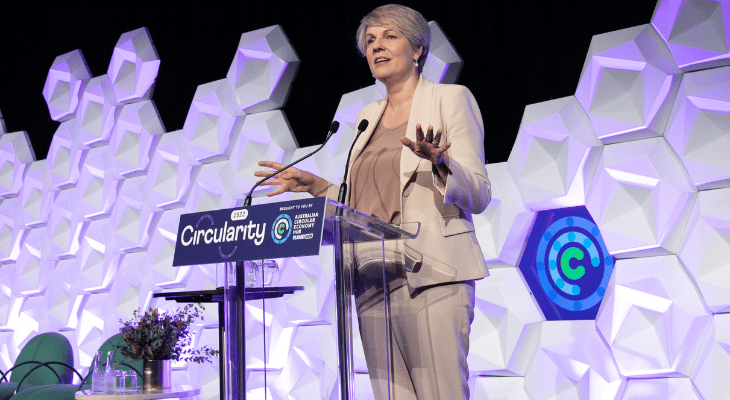New advisory group to guide Australia’s circular economy transition
Federal Minister for the Environment and Water Tanya Plibersek announced the Ministerial Advisory Group on the Circular Economy at the inaugural Circularity conference in Sydney.
This new expert group has been established to guide Australia as it transitions to a circular economy by 2030.
The new expert group will be chaired by Professor John Thwaites AM, with membership including Australia’s Chief Scientist, Dr Cathy Foley and outgoing chief executive of CSIRO, Dr Larry Marshall.
The group will look at how products are designed, manufactured, and used across all sectors of the economy, and identify meaningful and direct changes the government and industry can make to drive the transition to a circular economy.
“Better waste management and more effective recycling are important – but they aren’t enough on their own,” Plibersek said. “As a country we must do more to design-out waste in the first place, and make better use of recovered resources.
“We know that Australians want to reduce their waste and use less disposable items in the first place – but we have to set up our economy to help them do this.”
Plibersek said that more than 70 per cent of a product’s environmental impact is locked in at the design stage, before it reaches the customer.
“This means we need to get things right at the start, well before we deal with its disposal,” she said.
The decision to establish the new Ministerial Advisory Group on the Circular Economy follows the Environment Ministers Meeting in October, where all Australian environment ministers agreed to work with the private sector to design out waste and pollution, keep materials in use and foster markets to achieve a circular economy by 2030.

Environment Minister Tanya Plibersek (centre), with Planet Ark Co-CEOs Rebecca Gilling (left), and Paul Klymenko (right)
Industry leaders react
The Waste Management and Resource Recovery Association of Australia (WMRR) welcomed the announcement.
“The recognition and action that this Federal Environment Minister has brought so quickly to understand both the complexity of material management in Australia and the need to focus on design, is hugely welcome and appreciated,” said Gayle Sloan, WMRR Chief Executive Officer.
She said the formation a group at the ministerial level would help support conversations with the community around consumption, and designing for re-use.
“Unfortunately, Australia remains one of the highest generators of waste globally, and with the current consumption and design approaches we are only managing to recycle about 60 per cent of what is placed on market,” Sloan said.
“With greater emphasis on design, material selection, utilising secondary raw materials, and avoidance, we really can shift the dial.”
Australian Council of Recycling (ACOR) Chief Executive Officer Suzanne Toumbourou also welcomed the news.
“We understand that this Advisory Group will have the mandate to assess how products are designed, manufactured and used across all sectors, and the regulatory, commercial and other barriers that exist on the road to a more circular economy,” she said.
“A fully functioning circular economy requires deep collaboration of all parts of the supply chain. In particular, there must be a shift towards procurement of recovered and recycled materials and an incentive to design for adaptability, disassembly, deconstruction and recovery. Small changes can make big impacts.”
Weren’t able to attend the 2022 conference? Circularity On Demand is coming soon and will provide digital access to all of our conference sessions, panel discussions and workshops from the November conference. You can check out the full 2022 program here.
This publication has been republished with permission from the Waste Management Review website “New advisory group to guide Australia’s circular economy transition” by Leon Cranswick on 25th November 2022.
-
Stay up to date with the latest news, industry insights and ReGen updates.
- SUBSCRIBE TO REGEN

